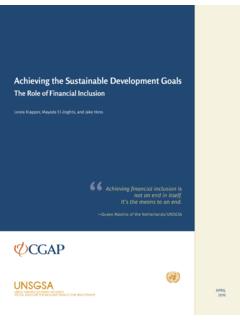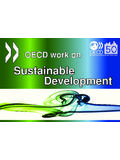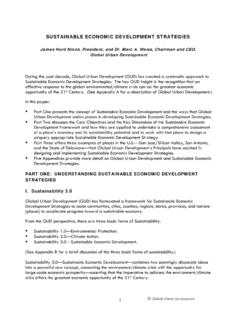Transcription of Basic Principles of Sustainable Development
1 GLOBAL Development AND ENVIRONMENT INSTITUTE. WORKING PAPER 00-04. Basic Principles of Sustainable Development Jonathan M. Harris June 2000. Tufts University Medford MA 02155, USA. Copyright 2000 Global Development and Environment Institute, Tufts University G-DAE Working Paper No. 00-04: Basic Principles of Sustainable Development . Basic Principles of Sustainable Development 1. Jonathan M. Harris 1. The Concept of Development Great ideas are usually simple ideas. While the specific analysis of any important topic will necessarily involve complexity and subtlety, the fundamental concepts which underlie powerful paradigms of thought are usually relatively straightforward and easy to grasp. In the area of social science, ideas which affect millions of people and guide the policies of nations must be accessible to all, not just to an elite. Only thus can they permeate institutions from the local to the global level, and become a part of the human landscape, part of the fabric within which we define our lives.
2 Such is the concept of Development . Prior to the second half of the twentieth century, the idea of Development as we know it today barely existed. The structures of imperial and colonial power which dominated the world in the nineteenth and early twentieth centuries made little provision for economic and social advance in what we now call the developing world. Colonial regions functioned primarily to supply imperial powers with raw materials and cheap labor including slave labor as late as the mid-nineteenth century. Within the richer countries of Europe, North America, and Japan, economic growth was of course central to the generally accepted goals of progress and modernization , but there was relatively little concern for issues of equity and social justice. The desperate poverty and weak or non-existent social safety nets in Europe and the United States during the Great Depression showed how even in these countries, policy was not driven by the needs of the majority of people.
3 By the end of the Second World War, perceptions and policy had changed drastically. Economic and social improvement for the majority had become a major preoccupation of 1. This paper will appear in The Encyclopedia of Life Support Systems , sponsored by the United Nations Educational, Scientific, and Cultural Organization (UNESCO). Portions of the paper will also appear in Jonathan Harris, Timothy Wise, Kevin Gallagher and Neva Goodwin eds., A Survey of Sustainable Development : Social and Economic Dimensions, Volume 6 in the series Frontier Issues in Economic Thought (Washington, : Island Press, 2001). 1. G-DAE Working Paper No. 00-04: Basic Principles of Sustainable Development . governments, and with the crumbling of colonial power relations this goal was extended to the poorer nations of the world. Economic Development , with its social and institutional correlates, came to occupy an essential place in theory and policy, as well as in the Cold War competition between capitalism and communism.
4 As the historian of economic thought Roger Backhouse puts it: Development economics in its modern form did not exist before the 1940's. The concern of Development economics, as the term is now understood, is with countries or regions which are seen to be under or less developed relative to others, and which, it is commonly believed, should, if they are not to become ever poorer relative to the developed countries, be developed in some way. 2. Within formal neoclassical economic theory, an effort has been made to achieve a positive rather than a normative perspective that is, to describe what is rather than positing what should be. Development economics, in contrast, is explicitly normative, as Backhouse's description makes clear. As such, it cannot avoid concern with social and political issues, and must focus on goals, ideals, and ends, as well as economic means. When Rostow published his ambitious overview of economic Development , The Stages of Economic Growth, in 1960, he subtitled it A Non-Communist Manifesto.
5 3. Conscious of the claims of Marxism to offer a path to a better future for the majority of the world's peoples, Rostow sought to counterpose a superior vision of social and economic goals. Notable in this perspective was a linear conception of economic Development . According to this view, all successfully developing countries would pass through a series of stages, from traditional society through economic take-off to maturity and high mass- consumption. The less-developed nations therefore might reasonably hope to achieve the mature status of the and Europe without the need for communist revolution. Rostow's concept of take-off, as well as his overall perspective of economic and social progress towards a goal of mass consumption, was widely accepted by Development theorists. 2. Backhouse, Roger (1991). A History of Modern Economic Analysis . Oxford, UK: Basil Blackwell. 3.
6 Rostow, (1960). The Stages of Economic Growth: A Non-Communist Manifesto 2. G-DAE Working Paper No. 00-04: Basic Principles of Sustainable Development . Thus economists, other social scientists, and policymakers adopted a framework of thought which was much more ambitious in its scope than previous formulations of political economy. The clear goal of economic Development policy was to raise living standards throughout the world, providing steadily more goods and services to an expanding population. The international institutional structures set up after the second world war, including the International Monetary Fund, the World Bank, and the United Nations, were specifically designed with this goal in mind. As Development policy has evolved, different approaches have been emphasized at different times. The original emphasis was on promoting more productive agriculture and industrialization.
7 In the late 1970's a focus on Basic needs was advocated by Paul Streeten, Mahbub Ul Haq, and Education, nutrition, health, sanitation, and employment for the poor were the central components of this approach reflecting an acknowledgment that the benefits of Development did not necessarily trickle down to those who needed them most. This perspective inspired the creation of the United Nations Development Programme's Human Development Index, which uses health and education measures together with Gross Domestic Product (GDP) to calculate an overall index of Development success. In the 1980's the focus shifted to structural adjustment , including liberalization of trade, eliminating government deficits and overvalued exchange rates, and dismantling inefficient parastatal organizations. Structural adjustment was seen as correcting the errors of earlier, government-centered Development policies which had led to bloated bureaucracies, unbalanced budgets, and excessive debt.
8 But critiques of structural adjustment policies have found them at odds with the Basic needs priorities. Market-oriented reforms have often lead to greater inequality and hardship for the poor even as economic efficiency improved. A tension thus remains between the Basic needs and market-oriented perspectives on Development . At the turn of the century, what is the 50-year record of the broad-reaching, and historically fairly young, effort at global Development ? The concept has been widely accepted, by countries of varied political structure. There have been remarkable successes notably in East Asia and worldwide progress both in standard GDP measures and in measures of human Development such as life expectancy and education. There have also been areas of slow or negative growth, especially in Africa, where GDP increase was slow and food production per 4. Streeten, Paul , with Shahid Burki, Mahbub Ul Haq, Norman Hicks, and Frances Stewart (1981).
9 First Things First: Meeting Basic Human Needs in the Developing Countries. Published for the World Bank. New York and Oxford: Oxford University Press. 3. G-DAE Working Paper No. 00-04: Basic Principles of Sustainable Development . capita in decline even before the rapid spread of AIDS devastated many countries and dramatically lowered life expectancies. Globally, most countries have made significant advances both in GDP and in Human Development Index measures. But overall, the record of Development on a world scale is open to two major criticisms: The benefits of Development have been distributed unevenly, with income inequalities remaining persistent and sometimes increasing over time. The global numbers of extremely poor and malnourished people have remained high, and in some areas have increased, even as a global middle class has achieved relative affluence. There have been major negative impacts of Development on the environment and on existing social structures.
10 Many traditional societies have been devastated by Development of forests, water systems, and intensive fisheries. Urban areas in developing countries commonly suffer from extreme pollution and inadequate transportation, water, and sewer infrastructure. Environmental damage, if unchecked, may undermine the achievements of Development and even lead to collapse of essential ecosystems. These problems are not minor blemishes on an overall record of success. Rather, they appear to be endemic to Development as it has taken place over the past half-century, and to threaten to turn success into failure. World Bank President James Wolfensohn and chief economist Joseph Stiglitz acknowledged in 1999 that these issues are crucial to address if global Development is to succeed. Harsher critics of the Development paradigm, such as Richard Norgaard, see them as indicative of fundamental error: Modernism, and its more recent manifestation as Development , have betrayed progress.

















